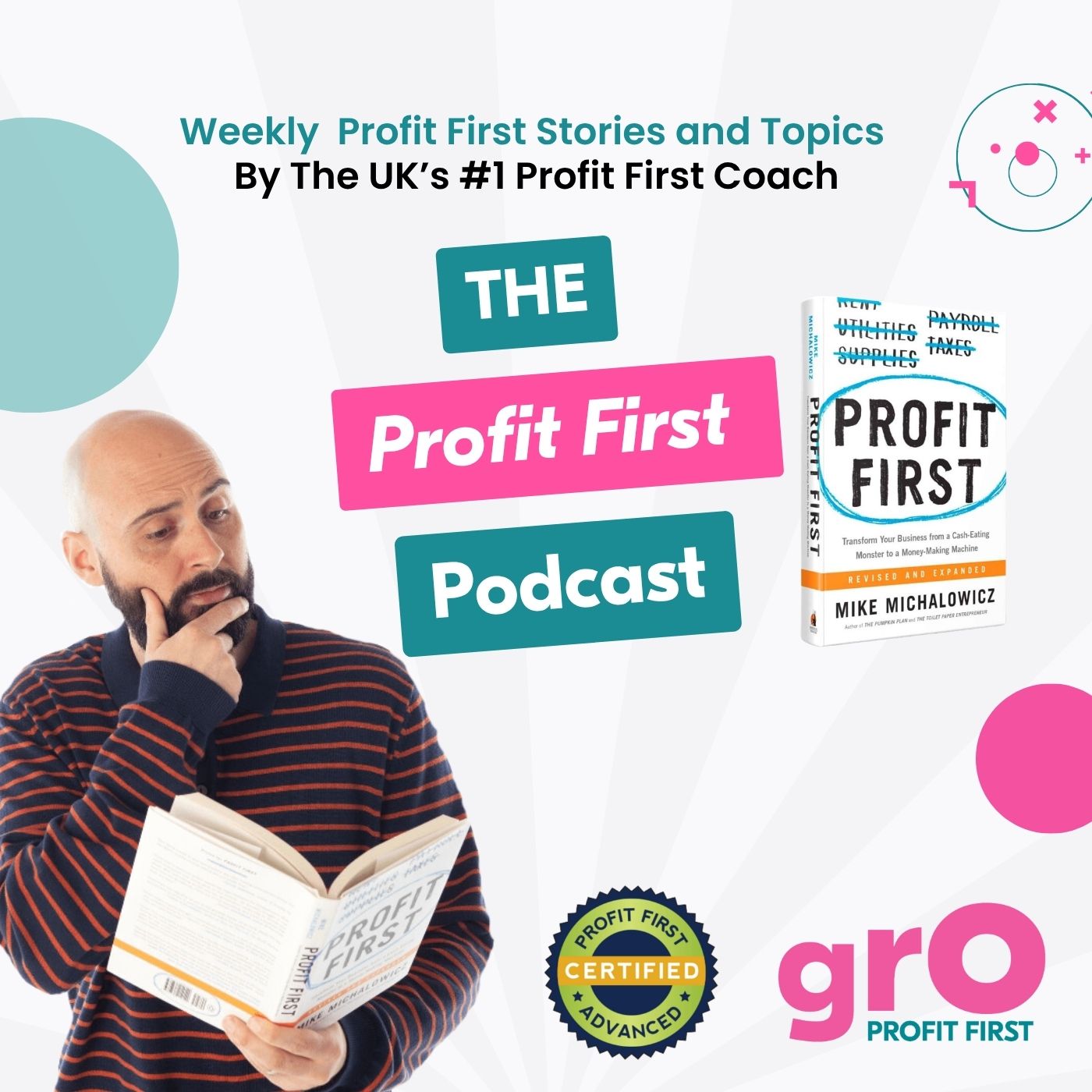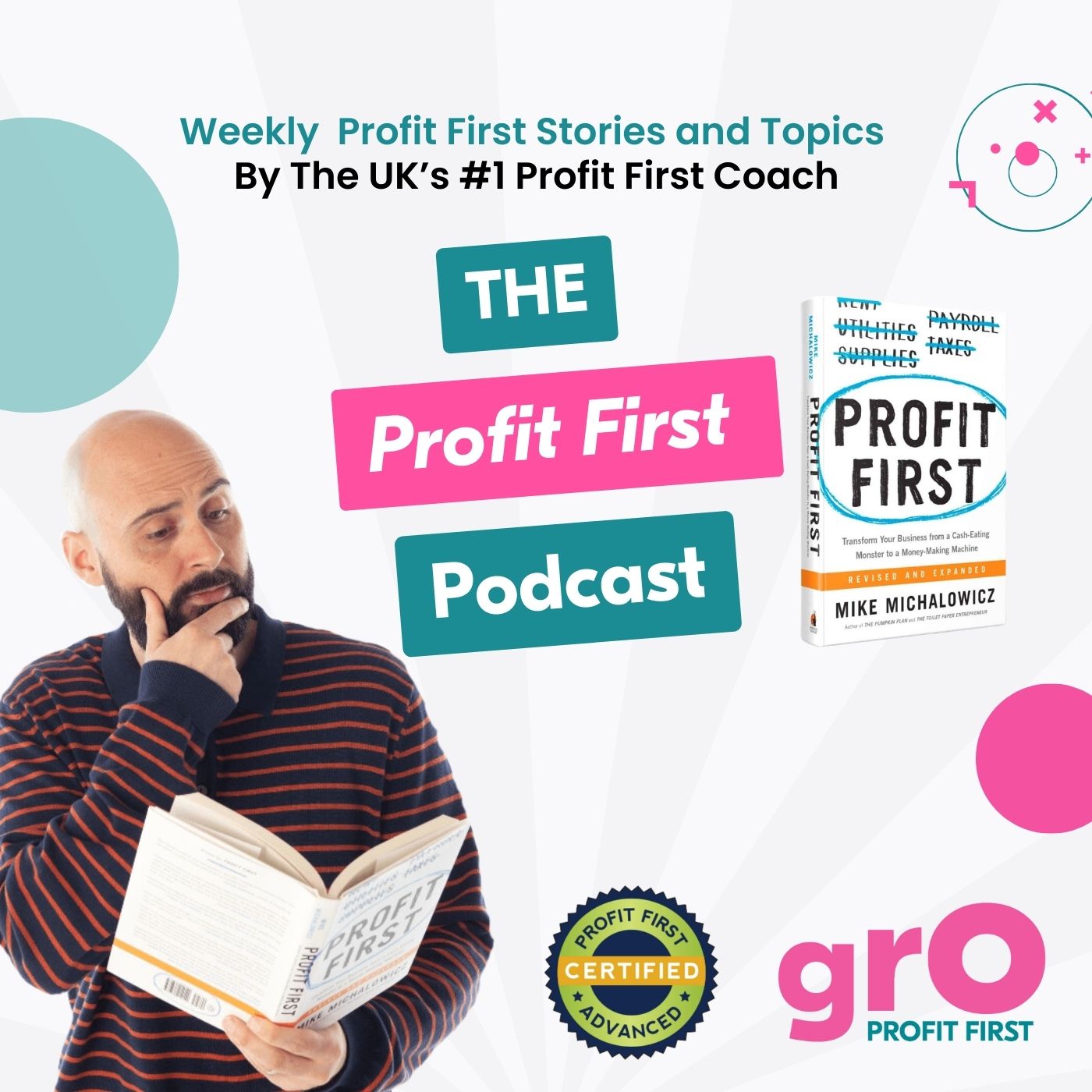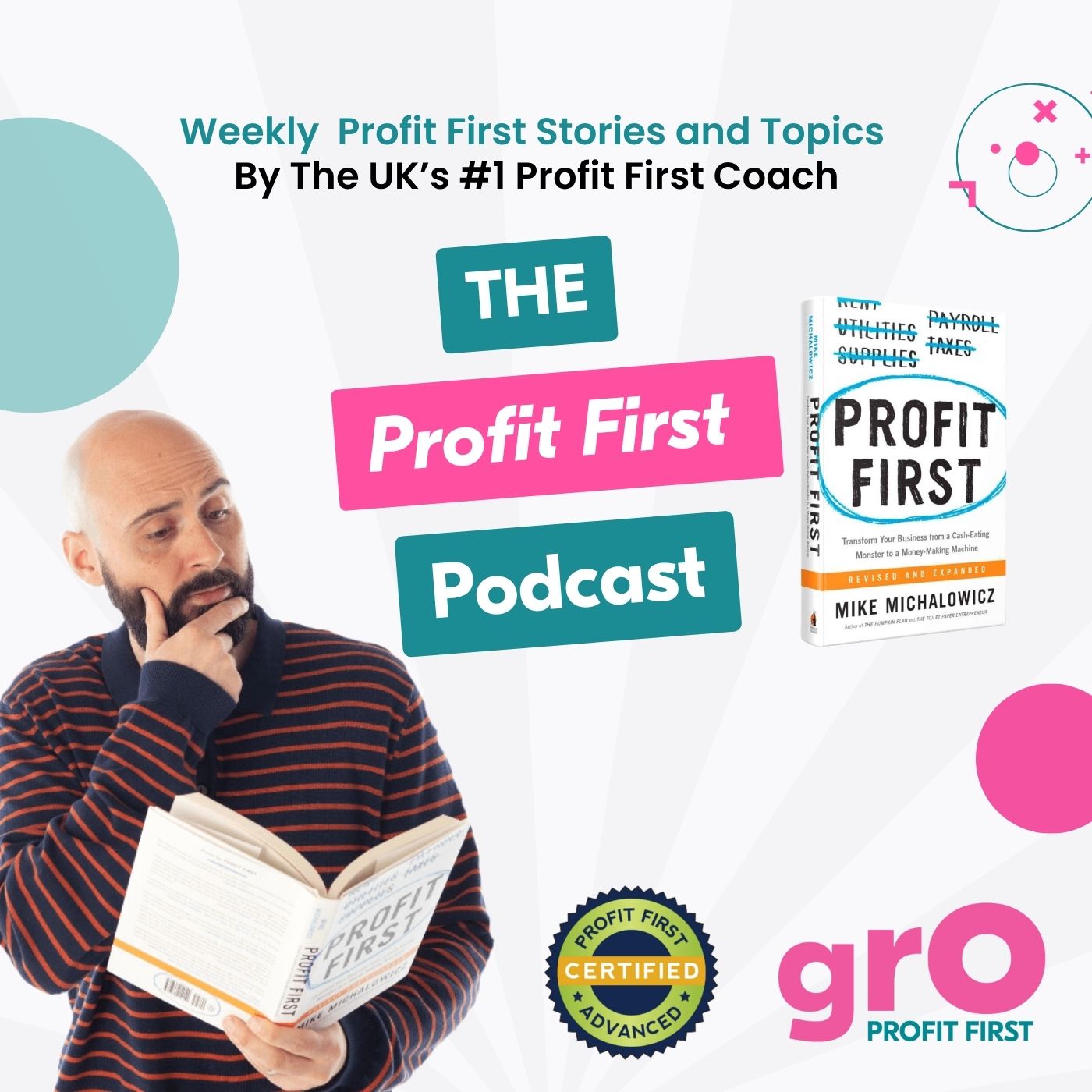Episode Transcript
[00:00:00] Excuses. Here I am. So welcome to the Profit first podcast. I'm Stephen Edwards and I'm the founder of Grow Profit First Accountants. We are certified Profit first professionals. We work with entrepreneurs to build a more profitable and a more sustainable business where yes, we're accountants. So we also look after your finance function.
[00:00:24] How can you build a solid finance function? So in this podcast we talk about all things profit, profit first, but also all things that are going to help you build a better business.
[00:00:35] If you want to deep dive into Profit first, feel free to reach out to us and we can direct you in some resources in terms of how to implement profit first in your own business. Kind of going beyond the book. The book is, is an amazing book and that's where people kind of learn about profit first. However, they often get a little bit overwhelmed.
[00:00:54] So we've got training videos and webinars where we literally show you how to implement profit first in your business. But for this week's top, I want to cover something that I feel a lot of entrepreneurs suffer from and that's overwhelm you. There's kind of two main types of business owners that struggling. There's the business owners where they're kind of heads in the sand and they're busy, you know, in the weeds really, and they're busy on the tools, they're busy doing the thing of whatever your business does. And if you're a self employed freelancer, then that's all good, that's fine because it's you, you kind of have to do everything. However, if you have a team, if you've built a team in your business and you're still in the weeds, then something's wrong. Unless you love to do what you're doing on a daily basis. So if you're kind of getting dragged from pillar to post and there's always these fires that need putting out and it's always on you as the business owner. That's what this week's podcast is all about. I'm going to help you focus on how to have a clear path in terms of not being as reliant in terms of everyone coming to you for all of the solutions, but also for people that have maybe grown a little bit beyond this. And maybe you do have a little bit of time for yourself. Maybe you do work on the business, quote, unquote. You know, there's working in the business, there's working on the business. Let's say you do work on the business and you've moved beyond the firefighter. Then another form of Overwhelm is what do you do with your time?
[00:02:23] There's so much stuff to do as a business owner because essentially you've got the four main functions. We, we provide the finance function and outsource finance function to our clients, but essentially you've got the marketing and sales function, you've got the finance, you've got the HR and you've got the operations. And when you're trying to grow a business, there's a million things to do. You need, you need to be the expert at marketing, you need to be the expert at sales, you need to know enough about the finances so you know the bills are getting paid and you've got the right cash flow forecasting and you know where the business is heading in the next 12 months. You need to, you want to put the process in place, you want to develop your team, you want to do recruitment, you want to learn about AI, you want to learn about tech. So there's a million things to do. So I'm going to speak to that today in this podcast as well, because I see both those problems. So if your problem is the first one, so if your problem is that essentially all of the decisions go through you in the business, you've got a team and you're still stuck in the weeds and you're trying to solve every single problem, then that's what my book was about last year. How to Build a Business that Runs without you. And in that book I talk about the Entrepreneurial Freedom system. It's a 10 step system based off the last 10 or 15 years of my life.
[00:03:42] How can you slowly but surely build a business that's not reliant on you? So rather than kind of give you all the detail spiel of all the different steps, I recommend you read that book, how to Build a Business that Runs without you. Just Google on Amazon. Stephen Edwards, how to Build a Business Runs without you. That is the place to start. Read that book, read a few chapters and feel free to reach out to me if you're wondering what to do next. So if that's your problem, you know, you're just, you're the person who's relied on for everything. That's definitely the place to start.
[00:04:14] However, if you kind of feel like you've moved a little bit beyond that and you've got time and space for yourself, there's another problem. It's what, how do you prioritize your time? What should you be working on? What's the most important thing?
[00:04:27] I'm not the biggest fan of to do lists, not in the to do list in a traditional sense anyway. The traditional to do list means there's always a million things to do.
[00:04:38] There's, you know, it comes at you from every single angle on a daily basis, and it just gets bigger. You know, no, no wonder people are overwhelmed. The to do list just gets bigger. I'm more of a fan of a priority list in terms of what are the most important things in your business. So I talk a lot about the 8020 principle.
[00:04:56] It's also known as the Pareto principle, where 20% of the things we do have 80% of the impact. I'm worried about those tasks on your list, but how do you feel? Figure that out. How do you know what the 20% is? So I'm going to give you a really practical tool today in this weekly podcast where it can just start the process of getting better at prioritizing what the most important thing is. So even if you go down from, let's say you've got 50 things on your list, the top 20% is still 10. How do you pick? What to work on? Is still a lot. It's still overwhelming. And the truth is, if you've got a traditional to do list, you've probably got 100 things on there. So you could have 20, and it's still too much.
[00:05:38] So the good news is I'm going to make it so simple for you, and it's not going to solve all your problems forever, but it's going to give you focus and clarity in terms of the next few weeks, maybe to finish this month strong, to make July a really good month, because, you know, we're breaking the back of the year now. We're moving towards. We're in the final quarter of 20, 25, and before you know it, we'll be approaching Christmas. So what you prioritize, what you focus on now can make a huge difference. So what I want you to do is I want you to think of the single most important thing thing in your business you know you should be doing.
[00:06:12] Steve Jobs has actually got a similar.
[00:06:16] Had a similar system to this. It's what's the most important thing I should be doing? Steve Jobs said, in my business, for the next 18 hours. Sorry, next 16 hours, because you're giving yourself eight hours for sleep. So basically, when I'm awake, what. What is the most important thing?
[00:06:32] And if you're wondering, how do I figure out what the most important thing is, you've probably got something come to your mind already, intuitively, if you've Got something in your mind, your gut is probably right. If you've got two or three things that you probably already know what this is normally something you're putting off because it's not. It's not easy. It might be simple, but it's not easy because you got to put some effort in. It's outside your comfort zone. You've got to face some harsh truths. However, if you're struggling to figure what that is, narrow down the top 20% like I've talked about previously, and then you've probably got a smaller list. And to focus on the most important thing, just give them a score. Okay? I want you to write them down. Let's say you've got six things and you're going to score them on two different headings. If you write down a piece of paper, the first one is a score from 1 to 10 on how difficult it is to implement in your business. Okay, so difficult could mean different things. It could be complexity, it could be cost, it could be time, it could be all sorts. So on a scale of 1 to 10, you know, if it's basically what we're looking for is we're looking for an overall high score and an overall low score. So, you know, maybe we should flip that to how easy is it to implement? Because it was score better. So 10 being super easy to implement, you could literally go and do it in the next hour.
[00:07:49] One being super difficult, it's going to take a seriously long time. It's going to take months or if not years for you to do. So. 10 is super easy. So on the scale of 1 to 10, how easy is it?
[00:08:00] Second one is how much of an impact do you think it will have on your business?
[00:08:05] 10 being it will have an absolutely huge impact on your business. One being it won't hardly have any impact on your business. So just rank these items on a scale of 1 to 10. 10 being it have a massive impact on being has hardly no impact. And somewhere along that kind of scale, and then 1 to 10, as I said, on how easy is it to implement?
[00:08:28] And now you multiply those two scores together and you will get a percentage out of a hundred.
[00:08:34] This will give you something to focus on. And the truth is you might be thinking, yeah, but is the easiest thing the best thing to do? But we're balancing, you know, momentum, quick wins, getting started, not making excuses and impact on your business. So if you've got something that is, it's a 10 in terms of being easy and it's a 10 in terms of the impact it makes.
[00:08:55] Go and do it. Why are you not doing that already?
[00:08:58] You know, sometimes it might be introducing follow up processes to follow with your leads, your prospects, your customers. It might be sorting out your finances.
[00:09:08] It might be, you know, making that key higher that you know you should have made for the last two years.
[00:09:12] What you know, it's whatever it means to you. And that's what's beautiful about prioritizing is we've all got different challenges, we've all got different goals. So if you do this, you will focus on the single most important thing in your business. And the idea is if you knock that down, that thing down, there will be a domino effect in your business. Everything else then becomes easier and you build the momentum, you build that focus. Focus on the one most important thing at any given time. However, sometimes you might hit a kind of a blocker with the most important thing because you're waiting on someone else.
[00:09:47] You know, let's say your most important thing is to build a website.
[00:09:49] It might be that you've got to wait four weeks for your website designer. That's why in reality you are probably going to end up with up to six kind of projects or goals. But I want you to do the scoring system to figure out in order, what are the most important things for you to work on in your business. Hopefully you found that useful. Any questions on this topic? Guys, I'm really passionate about freeing up your time as a business owner. It's why I released my book how to build a business that runs without you last year.
[00:10:17] If you want any questions on this, you want to learn more about the entrepreneurial freedom system, I talk about a not to do list which is one of the most powerful things you can do to free up your time. Feel free to drop me a message. I'm more than happy to share my experience and have a great week. Thanks everyone.
[00:10:31] Excuses.


